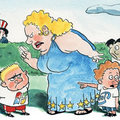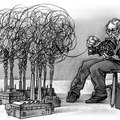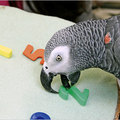A surprise visit by George Bush
| |
 | |
AS A piece of political theatre, one could not help admiring it. Without any warning George Bush popped up in Iraq on Monday September 3rd, accompanied by his defence secretary, Robert Gates, his secretary of state, Condoleezza Rice, as well as the commander of America’s forces in Iraq, for a meeting with the country'st prime minister, Nuri al-Maliki.
The choice of venue was significant. It took place in an American airbase some 120 miles (around 180km) west of Baghdad, in the heart of Anbar province. Until a few months ago such a trip would have been extremely risky if not impossible: Anbar was the crucible of the Sunni uprising against America’s presence in Iraq, and as dangerous a spot as you could find anywhere in the country. Mr Bush’s trip was designed to emphasise his claims that the “surge” of some 30,000 extra troops into Iraq—the reinforcements were directed at Baghdad, its periphery and at Anbar—is finally starting to show results.
The visit is part of the fuss that surrounds a report on the progress of the surge that the American commander, General David Petraeus, is expected to deliver to Congress next week, probably on September 11th, the sixth anniversary of the terrorist attacks on New York and Washington, DC. Ostensibly, the purpose of the meetings was to allow Mr Bush a final chance to assess the evidence before deciding, once the report is issued, what the direction of American policy should be thereafter. In reality he has said so often that he has no intention of withdrawing from Iraq that any substantial change of policy looks highly unlikely. Rather, the trip is aimed more at wavering Republicans, and even a few wavering Democrats, in the hope that they may moderate demands for an early American exit.
Anbar is worth some celebration. Partly because of growing revulsion at atrocities committed by al-Qaeda against “collaborators”—sometimes including children—and partly because of a more robust American presence, Sunni leaders there have turned against al-Qaeda's mainly non-Iraqi fighters. The level of attacks, both against American troops and against Iraqi civilians, has dropped substantially. That said, it was still impossible for Mr Bush to venture outside the vast and mightily-guarded desert airbase, just as he could not have visited any part of Baghdad outside the protected Green Zone. Even though the number of attacks in Baghdad has fallen off sharply, it remains a horribly dangerous place by any standards other than Iraq’s own.
Another reason for the visit lies in the luring of Mr Maliki, who leads a Shia-dominated government, to visit Sunni Anbar. While General Petraeus will have a certain amount of good news to report on the military front, he will not be talking to Congress alone next week. Also testifying will be Ryan Crocker, America’s ambassador to Iraq. He will have to admit that there has been extremely limited progress on the political front. Hopes of seeing an Iraqi government that brings together Shia and Sunni have consistently been frustrated.
Mr Bush and his team have tried everything they can, including both cajoling and insulting Mr Maliki, to get him to form a more representative government, and the meeting in the desert doubtless saw another push in that direction. But the prime minister heads a fractious coalition which opposes making the sort of concessions, particularly on government structures and the division of oil revenues, that the Sunnis would want to see before agreeing to join in. Mr Bush's flying visit will have made headlines, but is unlikely to alter anyone’s views.





